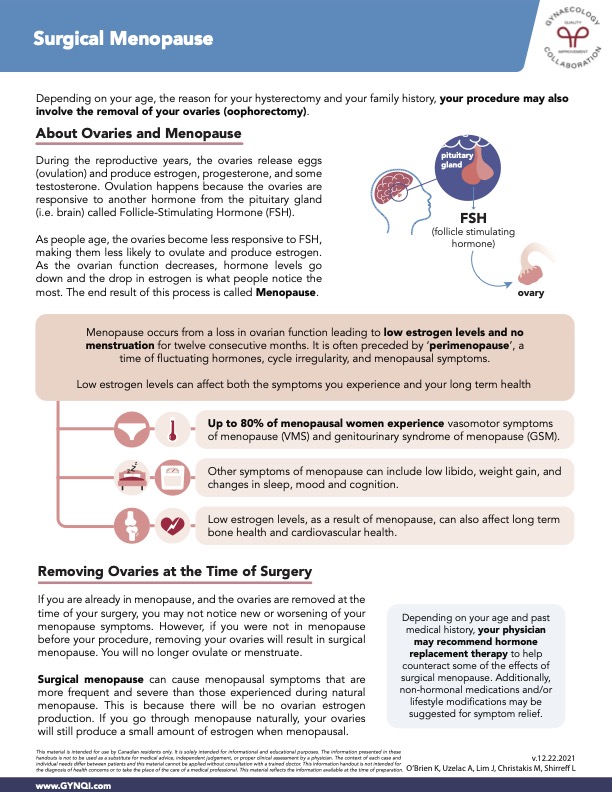
Table of Contents
- Summary
- About Ovaries and Menopause
- Why Does Menopause Occur?
- Symptoms of Menopause
- Removing Ovaries at the Time of Surgery
- Surgical Menopause
- Decoding the Complexities of Menopause
Summary:
- The ovaries play a vital role in reproductive health by releasing eggs and producing hormones like estrogen, progesterone, and testosterone, regulated by Follicle-Stimulating Hormone (FSH).
- Aging reduces ovarian function, leading to decreased estrogen production and the onset of menopause, defined as twelve consecutive months without menstruation.
- Surgical menopause can occur if ovaries are removed during a hysterectomy, often resulting in more severe symptoms due to the immediate loss of estrogen.
- Consultation with healthcare providers about hormone replacement therapy and lifestyle modifications can help manage menopausal symptoms and support overall health.
Understanding ovarian function plays a vital role for people undergoing a hysterectomy, especially with an oophorectomy. Aging leads to reduced ovarian function and menopause, marked by decreased estrogen levels and various symptoms after twelve months without menstruation. Surgical menopause can intensify these symptoms due to the immediate loss of estrogen.
It’s important to consult your healthcare provider about your options to effectively manage symptoms, keeping your long-term health in mind.
About Ovaries and Menopause
Depending on your age, the reason for your hysterectomy, and your family history, your procedure may also involve the removal of your ovaries (oophorectomy).
During the reproductive years, the ovaries release eggs through a process known as ovulation. They also produce hormones such as estrogen, progesterone, and some testosterone. This process is regulated by Follicle-Stimulating Hormone (FSH), which is secreted by the pituitary gland in the brain.
As individuals age, the ovaries become less responsive to Follicle-Stimulating Hormone (FSH), resulting in reduced ovulation and decreased estrogen production. This decline in ovarian function leads to lower hormone levels, with the most noticeable change being the drop in estrogen.
The end result of this process is called menopause.
Why Does Menopause Occur?
Menopause occurs due to a loss of ovarian function, resulting in low estrogen levels and the absence of menstruation for twelve consecutive months. It is typically preceded by perimenopause, a phase characterized by hormonal fluctuations, irregular cycles, and menopausal symptoms.
Low estrogen levels can impact both the symptoms experienced during menopause and long-term health.
Symptoms of Menopause
Up to 80% of menopausal women experience vasomotor symptoms (VMS) and genitourinary syndrome (GSM) associated with menopause.
Other symptoms of menopause can include:
- Low libido
- Weight gain
- Changes in sleep
- Mood changes
- Changes in cognitive function
Low estrogen levels, as a result of menopause, can also affect long-term bone health and cardiovascular health.
Removing Ovaries at the Time of Surgery
If you are already in menopause and your ovaries are removed during surgery, you may not experience new or worsening menopause symptoms. However, if you were not in menopause prior to the procedure, the removal of your ovaries will lead to surgical menopause, meaning you will stop releasing eggs and will no longer have periods.
Surgical Menopause
Surgical menopause can lead to menopausal symptoms that are more frequent and more severe than those experienced during natural menopause. This is due to the absence of estrogen production from the ovaries, which normally continues in small amounts even during natural menopause.
Based on your age and medical history, your physician may recommend hormone replacement therapy to alleviate some effects of surgical menopause. They may also suggest non-hormonal medications and lifestyle modifications for additional symptom relief.
Decoding the Complexities of Menopause
Understanding the ovaries’ role in menstrual health and menopause is crucial for those undergoing a hysterectomy, particularly with oophorectomy. Aging leads to reduced ovarian function and menopause, marked by lower estrogen levels and various symptoms. Surgical menopause can intensify these symptoms due to the immediate loss of estrogen.
Speaking with your healthcare provider about hormone replacement therapy and lifestyle changes can help you manage your symptoms and support your long-term health.



